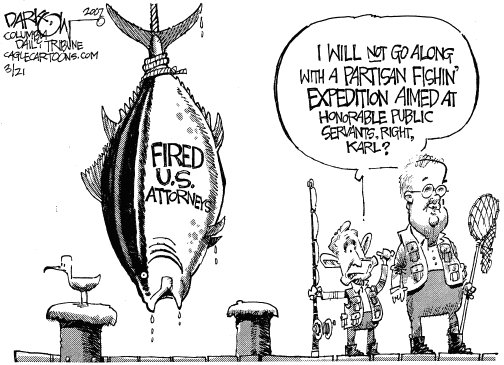 An editorial / By Dale McFeatters Scripps Howard News Service March 22, 2007
But Democrats and some Republicans also likely feel that they have no choice to reject the very limited compromise the president has offered: The aides would address only certain questions in private with no oaths being administered and no transcripts kept. These precautions suggest the White House fears there could be some legal fallout.  Artist John Darkow, Columbia Daily Tribune, Missouri Distributed to subscribers for publication by Cagle Cartoons, Inc.
In a brief appearance before reporters, Bush argued that he has the right to fire federal prosecutors, who serve at the pleasure of the president, for any reason or no reason at all. He noted that all eight had served full four-year terms and that the start of his second term was a natural time to shuffle personnel. All this is true, but the White House is only now making the arguments it should have made at the time. Instead, as the president admitted, the explanations for the changes were confusing, incomplete and badly handled. Inexcusably, the Justice Department trashed the prosecutors' professional reputations and subsequent departmental e-mails that came to light established that there was considerable political motivation involved, specifically the failure of some of the U.S. attorneys to mount high-profile, pre-election investigations of Democrats for voter fraud. There is enough there to warrant further congressional investigation, as many Republicans tacitly conceded by not opposing the approval of subpoena authority by the House and Senate Judiciary committees. There is precedent for White House aides testifying under oath and in public before Congress, and surely safeguards could be negotiated to protect presidential confidentiality. Many of the separation-of-powers issues here are more a matter of tradition than law, and it would serve no one's interest if this basically political dispute became a constitutional confrontation to be settled by the Supreme Court. Distributed to subscribers for publication by Scripps Howard News Service, http://www.scrippsnews.com
|